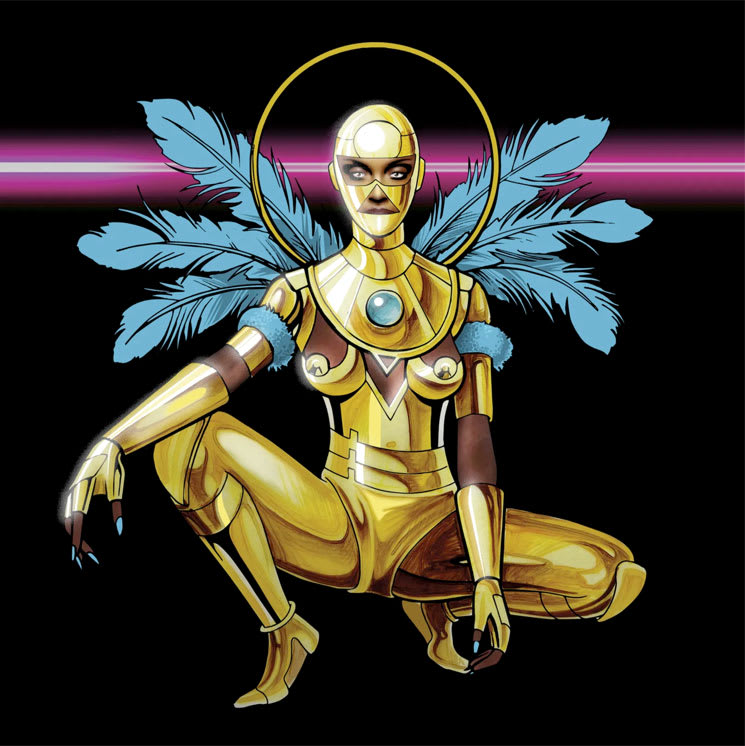Between 2013 and 2016, Dawn Richard used electronic music as bedrock in chronicling personal and professional trials over a trilogy of acclaimed albums, staking her claim as an R&B innovator, style fusionist and futurist in the name of artistic freedom. Further coronation came with 2019's new breed, a more direct embrace of her New Orleans roots that now inform Second Line: An Electro Revival.
As its subtitle implies, electronics are what drive Richard's King Creole alter ego — the armoured, feathered figure illustrated on the album's cover — through the set of songs inspired by the titular parade tradition that, as Richard's mother explains in a clip of conversation, has no "set steps." But as the dance goes on, Second Line's sound and spirit seldom reach the fever pitch of the artist's prior electro excursions.
Richard first commands listeners to get up and move with a slick suite of dance numbers to open the album, backing up her character's introductory proclamations: "The movement is me," and, "I am the genre." The mid-tempo groove and twinkling synths of "Nostalgia" allow listeners to find their feet in time for the pumping "Boomerang," accentuated by mesmeric vocal harmonies, steady bass, whip sounds and whistles.
"Bussifame" is another compelling call to get down, as its shifty beats and house chords pair with Richard's raps for a skilful build to "Pressure," a dynamic dance floor reprieve achieved through dialling back the BPM of bounce claps and footwork drums to bolster affecting vocals. "Jacuzzi," sandwiched between a pair of brief interludes, revels in innuendo as Richard heats things up for a lover to "hit it like a snare" and "go pound for pound" in between saucy dancehall choruses.
From there, Second Line shifts away from beat-driven structures to place feel over form. Those aforementioned interludes feel underdeveloped here — unlike past inclusions, which were strong enough to stand as their own musical ideas, or serve as a smooth segue between tracks.
"Pilot" and "FiveOhFour" are short-changed by quick fadeouts and bland beats, while "Le Petit Morte" hinges more on the listener being able to recognize Beethoven's piano than key in to Richard's powerful vocal. Both "Voodoo (Intermission)" and the later "(Outermission)" don't see their striking melodies developed beyond brevity and repetition.
Synth bass and lead glides of "Radio Free" and "The Potter" point towards an emotional summit that doesn't arrive, as instrumentals inadequately back Richard's messages of love, loss and resolve alone. The lengthier "Mornin/Streetlights," "Perfect Storm" and closer "SELFish" suffer similarly in spite of their beat switching, tending to let production set a mood as opposed to pushing the songs beyond the grooves into which they have settled.
New label home or not, Richard remains a testament to boundary-pushing, genre bending and expectation-shattering art, though Second Line's tempered grandiosity ultimately leaves her ambition underserved.
(Merge Records)As its subtitle implies, electronics are what drive Richard's King Creole alter ego — the armoured, feathered figure illustrated on the album's cover — through the set of songs inspired by the titular parade tradition that, as Richard's mother explains in a clip of conversation, has no "set steps." But as the dance goes on, Second Line's sound and spirit seldom reach the fever pitch of the artist's prior electro excursions.
Richard first commands listeners to get up and move with a slick suite of dance numbers to open the album, backing up her character's introductory proclamations: "The movement is me," and, "I am the genre." The mid-tempo groove and twinkling synths of "Nostalgia" allow listeners to find their feet in time for the pumping "Boomerang," accentuated by mesmeric vocal harmonies, steady bass, whip sounds and whistles.
"Bussifame" is another compelling call to get down, as its shifty beats and house chords pair with Richard's raps for a skilful build to "Pressure," a dynamic dance floor reprieve achieved through dialling back the BPM of bounce claps and footwork drums to bolster affecting vocals. "Jacuzzi," sandwiched between a pair of brief interludes, revels in innuendo as Richard heats things up for a lover to "hit it like a snare" and "go pound for pound" in between saucy dancehall choruses.
From there, Second Line shifts away from beat-driven structures to place feel over form. Those aforementioned interludes feel underdeveloped here — unlike past inclusions, which were strong enough to stand as their own musical ideas, or serve as a smooth segue between tracks.
"Pilot" and "FiveOhFour" are short-changed by quick fadeouts and bland beats, while "Le Petit Morte" hinges more on the listener being able to recognize Beethoven's piano than key in to Richard's powerful vocal. Both "Voodoo (Intermission)" and the later "(Outermission)" don't see their striking melodies developed beyond brevity and repetition.
Synth bass and lead glides of "Radio Free" and "The Potter" point towards an emotional summit that doesn't arrive, as instrumentals inadequately back Richard's messages of love, loss and resolve alone. The lengthier "Mornin/Streetlights," "Perfect Storm" and closer "SELFish" suffer similarly in spite of their beat switching, tending to let production set a mood as opposed to pushing the songs beyond the grooves into which they have settled.
New label home or not, Richard remains a testament to boundary-pushing, genre bending and expectation-shattering art, though Second Line's tempered grandiosity ultimately leaves her ambition underserved.
